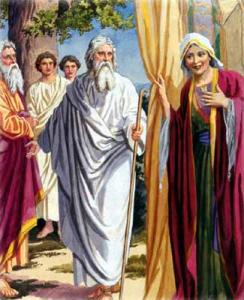 The passage for today has played an outsized role in the ongoing theology of the church. This is so because of vs.6 that is usually translated: “He (Abram) believed YHWH, and YHWH reckoned it to him as righteousness” (NRSV among others). I would translate as follows: “He trusted YHWH, and YHWH planned righteousness for him.” My reading assumes that the trust that Abram announces to YHWH, in the face of no certain evidence that YHWH will in fact make good on the grand promise of land and progeny made at Gen.12:1-3, is no absolutely sure thing. Abram after all is full of doubts about the whole matter, and given the actual circumstances of his life with his wife, Sarai, he has good reason for his hesitancy.
The passage for today has played an outsized role in the ongoing theology of the church. This is so because of vs.6 that is usually translated: “He (Abram) believed YHWH, and YHWH reckoned it to him as righteousness” (NRSV among others). I would translate as follows: “He trusted YHWH, and YHWH planned righteousness for him.” My reading assumes that the trust that Abram announces to YHWH, in the face of no certain evidence that YHWH will in fact make good on the grand promise of land and progeny made at Gen.12:1-3, is no absolutely sure thing. Abram after all is full of doubts about the whole matter, and given the actual circumstances of his life with his wife, Sarai, he has good reason for his hesitancy.
Sarai is “barren,” we are told at Gen.11:30, “she had no child.” Just like this God to choose one of the infertile couples in the Near East to found a great nation! As their years together grow longer, the couple remains childless. In addition the relationship between the two appears somewhat tenuous as Abram almost blithely offers Sarai to the willing pharaoh of Egypt in a craven attempt to save his own skin (Gen.12:10-21). Then occur two stories that suggest a rather better Abram, as he first offers his nephew Lot first choice in the land of promise (Gen.13:8-12), and second, assembles an army to rescue that same nephew from a coalition of warlike kings (Gen.14:1-16). Yet, that nagging doubt creeps back in Gen.15. In response to God’s promise that Abram’s “reward will be very great,” using a word “reward” that nearly always means “wages” for work, Abram simply does not believe it, crying out, “O Lord YHWH, what will you give me since I am still childless, and the son of Meshek, that boy from Damascus, is in my household” (Gen.15:2)? This difficult Hebrew sentence apparently means that a household worker is the only heir that Abram and Sarai have, since God has not given to them a real heir from Sarai’s womb.
Not so, retorts God! This man is no heir! And God dramatically leads Abram outside to gaze at the night sky. “Have a look at all those stars! So shall your descendants be,” proclaims God! And then vs.6 is uttered about Abram: “He trusted YHWH.” But not for long, I fear! The doubts are too soon back. God reiterates that “I am YHWH who brought you from Ur of the Chaldeans to give you this land to possess” (Gen.15:7). The supposed trusting Abram meekly responds to this divine promise, “O YHWH God, how am I to know that I will possess it” (Gen.15:8)? In reply YHWH arranges an elaborate and mysterious ritual with bloodied animals, a smoky firepot, and a flaming torch, in the midst of which YHWH announces Abram’s future, along with the glorious future of the vast offspring he will engender (Gen.15:9-20). Surely, that spooky drama will convince old doubting Abram that God can be fully trusted to bring about what YHWH has promised.
Not so! Both in chapters 16 and 17, Sarai and Abram cook up a plot to gat a son, since YHWH seems not to be willing to offer one to them. Sarai suggests that the aging Abram sleep with their Egyptian slave girl, have a child with her, which they can adopt and thereby finally have a child. The plot works at first. Abram seems all too willing to cohabit with the younger slave, and she duly becomes pregnant and gives birth to a son who is named Ishmael (“God hears”). But the plot is soon spoiled, because a jealous Sarai simply refuses to accept the child as truly her own, and demands that Abram throw him out of the camp along with his mother, something Abram meekly agrees to do. If God had not acted on their behalf, both mother and child would have perished in the wilderness. Then the laughter game begins in Gen.17, as first Abram falls on his face and roars with sardonic humor when God once again promises him a son. Fat chance, screams Abe! Have a look at this prune face and my wife’s withered body, God (Gen.17)! Then Sarai, now become Sarah, joins in with a silent chortle of her own when YHWH shows up at the family tent and still again promises a child to the aged pair (Gen.18). But, finally, the incredibly old woman does give birth to a son, who quite rightly is named Isaac (“laughter”); what else would you call a boy if you gave birth to him at age 90+?
Just where is this vaunted trust in God, proclaimed by Abram, and remembered in multiple places in Scripture, most especially in the New Testament? For example in the famous passage from the letter to the Hebrews 11:8-12, Abraham is lauded for his faith, his absolute trust in the God of the promises; though he had no idea where he was going when God took him from his home and led him to a new land, he went; though he was far too old, by faith he trusted that he would finally receive his own heir, and he did. Abraham is remembered as a man of absolute trust, as Gen.15:6 appears to say. Also, in Paul’s letter to the Romans, chapter 4, the apostle uses Gen.15:6 as the hallmark verse to announce that faith (trust) is not based on any kind of works on our part. This is so, because Abraham trusted God prior to his circumcision, the ultimate work in Jewish thought; that is the actions of Gen.15 precede the actions of Gen.17, hence genuine faith in God is not based on any kind of works. However specious we 21st century Bible readers may find such an argument, in Paul’s time it apparently carried force.
Despite Paul’s reliance on Abraham’s faith as a sign of his full trust in God, and despite the author’s reliance on Abraham’s faith as a sign of his absolute trust in God, the fuller stories in the book of Genesis do not finally suggest that Abraham fully trusted God at all times even after his grand avowal at Gen.15:6. Thus, I conclude that Abraham’s faith in God is precisely like my own; weak at times, vacillating quite often, not fully rooted in the promise that God has offered. In short, the handmaid of faith inevitably is doubt. Though I may proclaim my trust in God, and attempt to live my life in the light of God’s promises, I always have my doubts, and not only in the darkness of a fretful night’s tossing and turning, but also in the full light of day. I regularly and often question the whole business of faith, and I would suggest that those who do not have not examined their lives closely enough, have not taken seriously enough the real pain and difficulties that life can present. Particularly, they and I have not looked closely enough at the vast numbers of our fellow creatures who live lives of degradation and oppression and lostness. I fear to say that it is those whose numbers are as the stars of the sky.
Without a large dose of healthy and persistent doubt, we run the risk of complacency and obliviousness, of a blind certainty of what God is about in our lives and the lives of others. I am finally quite unsure of what God wants from me. My trust in God is not based on the certain outcomes of God’s actions in the world, but on the promises that God has made to bring about the final triumph of righteousness, in God’s time and in God’s ways. In that way I can affirm what I think Gen.15:6 says: “I trust God, because God plans for me God’s righteousness.” Still, exactly what that means from day to day, I am not wholly sure; but I trust nonetheless.
(Images from Wikimedia Commons)











